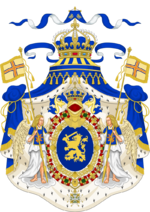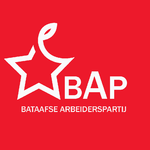Lagerhuis elections, 1680: Difference between revisions
From MicrasWiki
Jump to navigationJump to search
No edit summary |
No edit summary |
||
| Line 30: | Line 30: | ||
[[File:Logo Radicalen.png|150px|center]] | [[File:Logo Radicalen.png|150px|center]] | ||
| | | | ||
[[File:Logo Republikeins Links.png|150px|center]] | |||
| | | | ||
[[File:Logo Bataafse Arbeiderspartij.png|150px|center]] | |||
|- | |- | ||
|Party leader | |Party leader | ||
|[[Benjamin Cambernon]] | |[[Benjamin Cambernon]] | ||
|[[Alexandra Lucius]] | |[[Alexandra Lucius]] | ||
| | |[[Joseph des Vinandy-Windsor]] | ||
|[[Jacques Montrarde]] | |[[Jacques Montrarde]] | ||
| | |[[Toon Tielemans]] | ||
| | |[[Alejandro Averlinks]] | ||
|- | |- | ||
|colspan=7|'''Political issues''' | |colspan=7|'''Political issues''' | ||
| Line 47: | Line 49: | ||
|More power in hands of the aristocracy, while keeping the number of voters in check (and limited to certain, wealthier groups). | |More power in hands of the aristocracy, while keeping the number of voters in check (and limited to certain, wealthier groups). | ||
|In favour of centralisation of power in hand of the parliament ([[Hogerhuis]] and [[Lagerhuis]]) in [['s Koningenwaarde]]. | |In favour of centralisation of power in hand of the parliament ([[Hogerhuis]] and [[Lagerhuis]]) in [['s Koningenwaarde]]. | ||
| | |Replacing the Monarchy with the Republic. | ||
| | |Ending the privileges of the ''elite'' (aristocracy, royals,...). Establishing worker councils to represent the wishes of the people. | ||
|- | |- | ||
|Foreign Affairs | |Foreign Affairs | ||
|Strengthening the Batavian Confederation, reconquista of Cibola. | |Strengthening the Batavian Confederation, reconquista of Cibola. | ||
|Neutrality, pro international trade | |Neutrality, pro international trade | ||
| | |Neutrality, stronger ties with the Kalirion Dynasty. | ||
|Attempts at integrating parts of the [[Batavian Confederation]] in a stronger, more unified Empire. | |Attempts at integrating parts of the [[Batavian Confederation]] in a stronger, more unified Empire. | ||
| | |Support to republican movements across Benacia to end the feudal systems. | ||
| | |Spreading a worker's revolution. Cooperation with other socialist nations and parties. | ||
|- | |- | ||
|Economical Affairs | |Economical Affairs | ||
|Bexit from the [[Shirerithian Customs Area]], participation in the [[Treaty of Brandenburg]]. | |Bexit from the [[Shirerithian Customs Area]], participation in the [[Treaty of Brandenburg]]. | ||
|Corporatism, free trade, Rhineland model | |Corporatism, free trade, Rhineland model | ||
| | |Laisser faire. Placing the economic affairs in hands of local administration, while limiting the spending of the State. | ||
|Protectionism. Nationalisation of certain properties. Special attention on rooting out corruption among nobility and higher ups. | |Protectionism. Nationalisation of certain properties. Special attention on rooting out corruption among nobility and higher ups. | ||
| | |Privatisation. Expansion of the social benefits. | ||
| | |Collectivisation of industry. Strengthening of the labour unions. | ||
|- | |- | ||
|Education and culture | |Education and culture | ||
|More development of the Lordship's. | |More development of the Lordship's. | ||
|Modern education with a focus on technological innovation, no forced patriotism | |Modern education with a focus on technological innovation, no forced patriotism | ||
| | |Handing over the education of the peoples to the church and local authorities. | ||
|A Batavian curriculum to promote patriotism and a desire to protect the nation's parliamentarian and royal traditions. | |A Batavian curriculum to promote patriotism and a desire to protect the nation's parliamentarian and royal traditions. | ||
| | |Modern, progressive education system. | ||
| | |The Books of the Revolutionaries are the sole kind of education the farmer and worker needs! | ||
|- | |- | ||
|State security | |State security | ||
|Creation of the Franco-Batavian military industrial complex. | |Creation of the Franco-Batavian military industrial complex. | ||
|Maintaining the status quo of outsourced private military through the Iron Militia, focus on key assets such as the navy and air force for direct state involvement. | |Maintaining the status quo of outsourced private military through the Iron Militia, focus on key assets such as the navy and air force for direct state involvement. | ||
| | |Limiting the armed forces in size, while promoting the existence of militias. | ||
|Increase in funds for the Army and Navy. Introduction of military service. | |Increase in funds for the Army and Navy. Introduction of military service. | ||
| | |A modern, strong, national army to protect the people. | ||
| | |The Red Army will squash the capitalist swines! | ||
|} | |} | ||
[[Category:Elections]] | [[Category:Elections]] | ||
Revision as of 16:30, 28 January 2020
The Lagerhuis elections in 1681 are scheduled at 20.XV.
Policies
| 1681 elections | Conservative Monarchistische Partij | Voorwaarts Batavië! | Ultraroyalisten | Radicalen | Republikeins Links | Bataafse Arbeiderspartij |
|---|---|---|---|---|---|---|
| Party name in Common tongue | Conservative Monarchist Party | Onward, Batavia! | Ultraroyalists | Radical Party | Republican Left | Batavian Worker's Party |
| Logo | ||||||
| Party leader | Benjamin Cambernon | Alexandra Lucius | Joseph des Vinandy-Windsor | Jacques Montrarde | Toon Tielemans | Alejandro Averlinks |
| Political issues | ||||||
| Interior Affairs | Maintaining the balance of powers, with the lifting of the state of emergency. | Ceremonial Monarchy, Democracy, Sphere sovereignty and corporatism | More power in hands of the aristocracy, while keeping the number of voters in check (and limited to certain, wealthier groups). | In favour of centralisation of power in hand of the parliament (Hogerhuis and Lagerhuis) in 's Koningenwaarde. | Replacing the Monarchy with the Republic. | Ending the privileges of the elite (aristocracy, royals,...). Establishing worker councils to represent the wishes of the people. |
| Foreign Affairs | Strengthening the Batavian Confederation, reconquista of Cibola. | Neutrality, pro international trade | Neutrality, stronger ties with the Kalirion Dynasty. | Attempts at integrating parts of the Batavian Confederation in a stronger, more unified Empire. | Support to republican movements across Benacia to end the feudal systems. | Spreading a worker's revolution. Cooperation with other socialist nations and parties. |
| Economical Affairs | Bexit from the Shirerithian Customs Area, participation in the Treaty of Brandenburg. | Corporatism, free trade, Rhineland model | Laisser faire. Placing the economic affairs in hands of local administration, while limiting the spending of the State. | Protectionism. Nationalisation of certain properties. Special attention on rooting out corruption among nobility and higher ups. | Privatisation. Expansion of the social benefits. | Collectivisation of industry. Strengthening of the labour unions. |
| Education and culture | More development of the Lordship's. | Modern education with a focus on technological innovation, no forced patriotism | Handing over the education of the peoples to the church and local authorities. | A Batavian curriculum to promote patriotism and a desire to protect the nation's parliamentarian and royal traditions. | Modern, progressive education system. | The Books of the Revolutionaries are the sole kind of education the farmer and worker needs! |
| State security | Creation of the Franco-Batavian military industrial complex. | Maintaining the status quo of outsourced private military through the Iron Militia, focus on key assets such as the navy and air force for direct state involvement. | Limiting the armed forces in size, while promoting the existence of militias. | Increase in funds for the Army and Navy. Introduction of military service. | A modern, strong, national army to protect the people. | The Red Army will squash the capitalist swines! |




